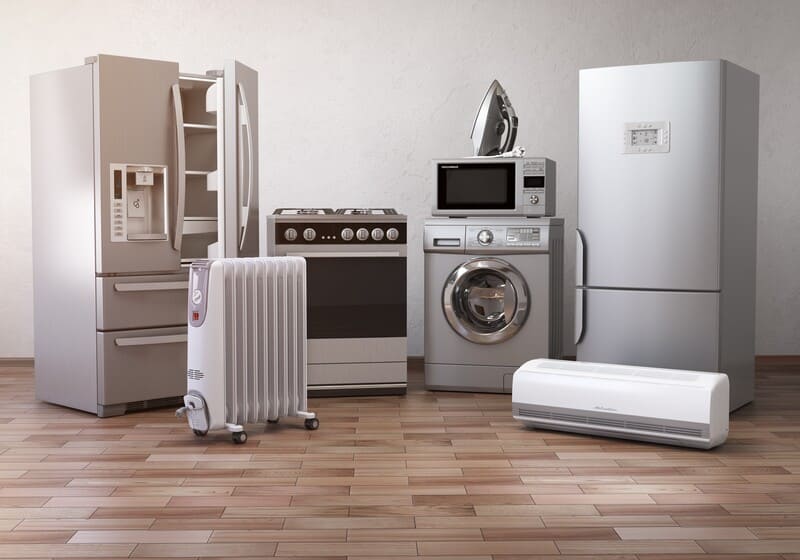Whether you’re getting ready to move into your new home with its own set of aging appliances, or you’re just taking stock of the ones you already own, it’s helpful to know just how much life they have left in them. New homeowners typically forget to budget for the average of $9,000 in hidden expenses they’ll run into in the first months and years of home ownership, and appliances are a substantial part of that expense. Here’s a breakdown of how long your home appliances should last, and how you can lengthen their lifespans to save money in the long run.
For All Appliances
Before we get started, the numbers you’ll see below are averages. You can get a rough estimate of how long your appliances have left before they give up the ghost based solely on their age, but what’s more important is how much use they get. A washing machine that handles clothes for a family of 5 will see a lot more action than a bachelor’s, for example, which will shorten its lifespan accordingly.
Oven Range: 13-15 Years
Whether you have a gas, electric or induction range, they tend to have similar lifespans. The best way to extend the life of your range is with regular cleaning. For gas ranges, make sure to clean the burner ports using a straight pin on a set schedule (usually once every three months)—this ensures that the ports don’t get clogged with grease that can cause uneven cooking and wear on the stove.
Dishwasher: 9-13 Years
The best advice for maintaining your dishwasher? Run it regularly. If you don’t, the rubber gaskets and seals that keep water where it’s supposed to be can dry out and fail. You should also clean out the filter regularly to avoid buildup that can keep water from draining from the dishwasher at the end of a cycle.
Refrigerator: 11-19 Years
Depending on the style you have, refrigerators can have very different lifespans. Typical side-by-side fridge/freezer combos normally last 14 years, while two-door fridges (top freezer, bottom refrigerator) last around 17 years. Since standalone freezers have to work harder than refrigerators, they also wear out faster. These last only about 11 years.
You can help your fridge last longer by reducing how hard it works on a daily basis. This means keeping the doors closed as much as possible, and keeping the temperature off the “coldest” setting.
Microwave: 9-10 Years
With not a lot of moving parts and even fewer serviceable ones, your microwave oven is one of the most durable appliances in your kitchen. That being said, there’s not a lot you can do to make yours last longer, besides keeping it clean and taking it easy on the door hinge.
Garbage Disposal: 10-12 Years
When it comes to garbage disposals, the most important thing to remember is what not to put down it. This includes foods like rice, egg shells, fibrous vegetables or grease, which can clog the disposal and dull its blades. To keep your garbage disposal clean, cut a lemon into smallish wedges and put them down the disposal, along with a handful or two of ice cubes. The acid in lemon juice combines with the gentle abrasive action of the ice to loosen stuck-on debris and eliminate odor, too.
Washing Machine/Dryer: 10 to 14 Years
For washing machines and dryers, lifespan is determined by which style you have. Top-loading washing machines tend to last a little longer than front-loading ones—the reason for this is up for some debate, but it may come down to the fact that front-loading washing machines are generally more technologically advanced. More moving parts, bells and whistles equal more opportunities for things to break down.
Dryers come in on the lower end of the lifespan range, simply because their heating elements tend to undergo more stress than washing machines.
Furnace: 15-18 Years
A gas furnace will normally outlast an electric one by about three years, and the reasons are twofold. First, gas is a more efficient fuel source than electricity, so the system doesn’t have to work as hard to provide the same amount of heat. Second, gas furnaces are usually less complex, with fewer parts that can wear and break. Also, today’s high-efficiency furnaces will outlast those using older technology.
AC Unit: 10-15 Years
In order to work with optimal efficiency, your air conditioning unit needs regular care and maintenance, starting with making sure the coils and foil fins are clean and straight. You’ll also want to call in a professional once a year to check the system’s refrigerant levels—if they’re too high or low, you’ll end up with problems like iced-over coils or too much stress put on the system.
Water Heater: 10-25 Years
Tankless water heaters can easily last over two decades, while more common tank models generally fall in the lifespan range of 10 to 15 years. Electric models wear out sooner, again because they’re less efficient. Other factors come into play with water heaters as well—for those with hard water, excess mineral buildup and scaling can shorten the life of this appliance, while those on a well water system should also look out for sediment deposits.
Call Your NPI Inspector Today
Our NPI inspectors have the knowledge and expertise to assess your home’s major systems and provide a full report. Find an inspector near you today to buy or sell with confidence.



